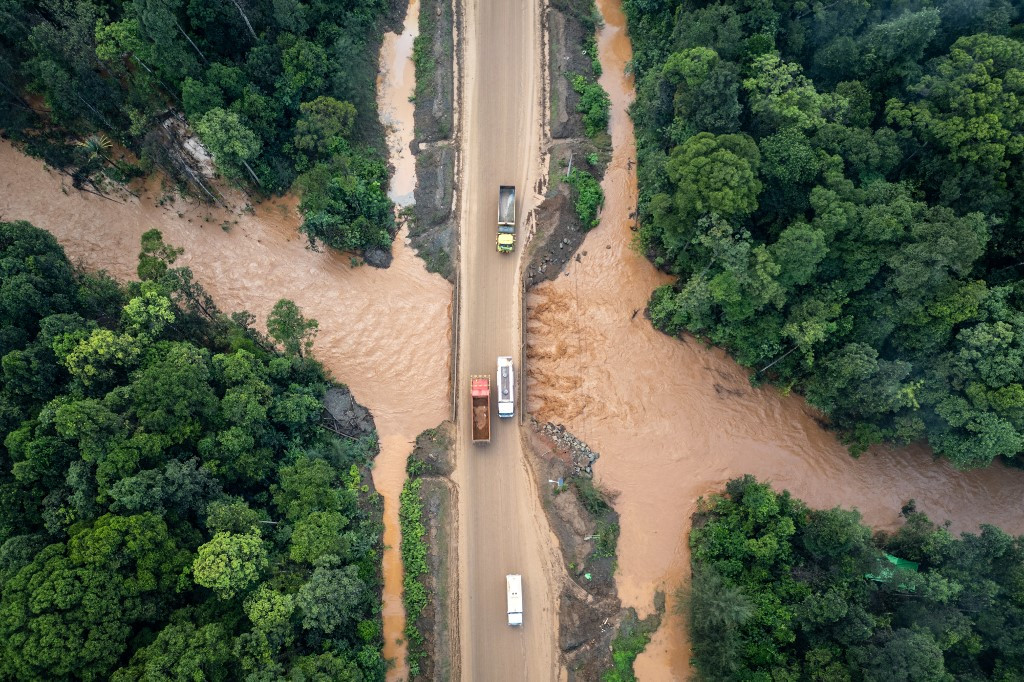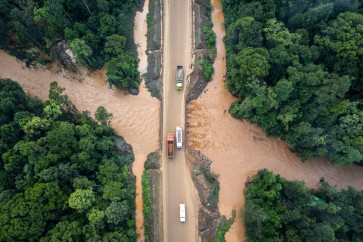Popular Reads
Top Results
Can't find what you're looking for?
View all search resultsPopular Reads
Top Results
Can't find what you're looking for?
View all search resultsFrom Mekong to Maluku: Why ASEAN must act now on river justice
ASEAN's failure to establish enforceable legal norms for shared water governance risks undermining both environmental justice and regional stability.
Change text size
Gift Premium Articles
to Anyone
 A transport road of a nickel mining site, which was constructed after forests were cleared, next to a river residents say has been contaminated by mining operations, is seen on April 14 in Central Halmahera, North Maluku. The home of the Hongana Manyawa indigenous tribe in central Halmahera was once a breathtaking kaleidoscope of nature that provided sanctuary and sustenance. But it is being eaten away by one of the world's largest nickel mining projects, as Indonesia exploits vast reserves of the metal used in everything from electric vehicles to stainless steel. (AFP/Yasuyoshi Chiba)
A transport road of a nickel mining site, which was constructed after forests were cleared, next to a river residents say has been contaminated by mining operations, is seen on April 14 in Central Halmahera, North Maluku. The home of the Hongana Manyawa indigenous tribe in central Halmahera was once a breathtaking kaleidoscope of nature that provided sanctuary and sustenance. But it is being eaten away by one of the world's largest nickel mining projects, as Indonesia exploits vast reserves of the metal used in everything from electric vehicles to stainless steel. (AFP/Yasuyoshi Chiba)
A
s Southeast Asia pursues rapid economic integration and infrastructure expansion, a profound crisis unfolds in its rivers. The Mekong, a lifeline for over 60 million across six nations, is severely threatened by upstream dams, unregulated mining and escalating industrial pollution. These contaminated waters reflect systemic failures in extractive development, fragmented governance and regional inaction.
In Northern Thailand, recent investigations show alarming arsenic levels in the Ruak, Sai and Kok Rivers, linked directly to gold and rare earth mining in Myanmar's Shan State. These vital Mekong tributaries now carry toxic legacies across borders, exposing a critical void in Southeast Asia's environmental governance. Without coordinated action, the region's development aspirations risk poisoning its most essential shared resource.
Similar environmental degradation plagues Indonesia's eastern provinces, like North Maluku, where indigenous food systems reliant on rivers such as the Sagea and Waleh are burdened by toxic legacies of nickel and gold extraction. From the Mekong Delta to Indonesia's archipelagic fringes, these riverine disruptions are not isolated incidents but part of a broader regional failure to manage transboundary environmental risks with politically fragmented responses.
Despite ASEAN's stated commitment to sustainability, embodied in frameworks like the ASEAN Socio-Cultural Community Blueprint 2025, its environmental governance remains "soft-law" oriented. This approach is characterized by weakness, a non-binding nature and excessive deference to state sovereignty.
In the Mekong subregion, imbalances between upstream and downstream states, exacerbated by Chinese infrastructural influence, impede cooperative solutions. Concurrently, Indonesia's decentralization has fragmented environmental oversight, widening the gap between Jakarta's climate diplomacy and the grim ecological realities faced by rural and indigenous communities.
These pervasive regional failures underscore ASEAN's urgent need to move beyond cautious consensus toward enforceable, rights-based frameworks for ecological justice.
ASEAN's Vision 2025 ostensibly aligns with United Nations Sustainable Development Goals (SDGs), including SDG 6 (clean water), SDG 12 (responsible consumption) and SDG 13 (climate action). However, practical contradictions persist between national economic ambitions and regional environmental obligations.


















